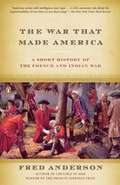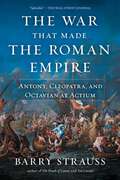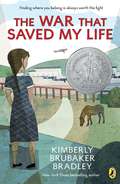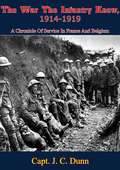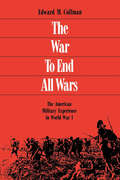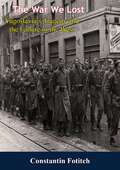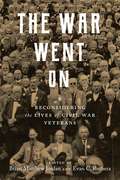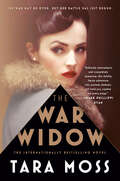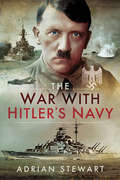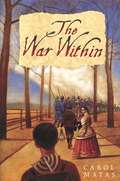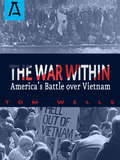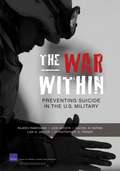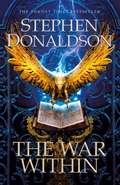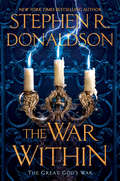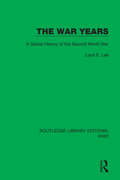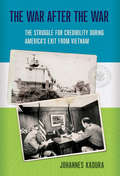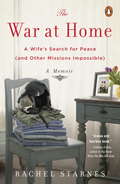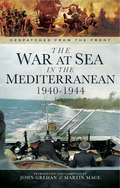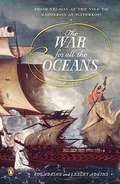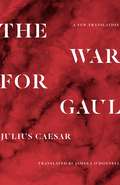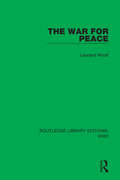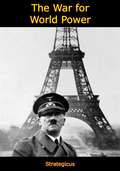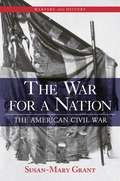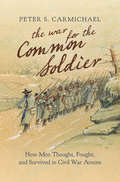- Table View
- List View
The War That Made America: A Short History of the French and Indian War
by Fred AndersonThe globe's first true world war comes vividly to life in this "rich, cautionary tale" (The New York Times Book Review) The French and Indian War -the North American phase of a far larger conflagration, the Seven Years' War-remains one of the most important, and yet misunderstood, episodes in American history. Fred Anderson takes readers on a remarkable journey through the vast conflict that, between 1755 and 1763, destroyed the French Empire in North America, overturned the balance of power on two continents, undermined the ability of Indian nations to determine their destinies, and lit the "long fuse" of the American Revolution. Beautifully illustrated and recounted by an expert storyteller, The War That Made America is required reading for anyone interested in the ways in which war has shaped the history of America and its peoples.
The War That Made the Roman Empire: Antony, Cleopatra, and Octavian at Actium
by Barry StraussA &“splendid&” (The Wall Street Journal) account of one of history&’s most important and yet little-known wars, the campaign culminating in the Battle of Actium in 31 BC, whose outcome determined the future of the Roman Empire.Following Caesar&’s assassination and Mark Antony&’s defeat of the conspirators who killed Caesar, two powerful men remained in Rome—Antony and Caesar&’s chosen heir, young Octavian, the future Augustus. When Antony fell in love with the most powerful woman in the world, Egypt&’s ruler Cleopatra, and thwarted Octavian&’s ambition to rule the empire, another civil war broke out. In 31 BC one of the largest naval battles in the ancient world took place—more than 600 ships, almost 200,000 men, and one woman—the Battle of Actium. Octavian prevailed over Antony and Cleopatra, who subsequently killed themselves. The Battle of Actium had great consequences for the empire. Had Antony and Cleopatra won, the empire&’s capital might have moved from Rome to Alexandria, Cleopatra&’s capital, and Latin might have become the empire&’s second language after Greek, which was spoken throughout the eastern Mediterranean, including Egypt. In this &“superbly recounted&” (The National Review) history, Barry Strauss, ancient history authority, describes this consequential battle with the drama and expertise that it deserves. The War That Made the Roman Empire is essential history that features three of the greatest figures of the ancient world.
The War That Saved My Life
by Kimberly Brubaker BradleyTen-year-old Ada has never left her one-room apartment. Her mother is too humiliated by Ada's twisted foot to let her outside. So when her little brother Jamie is shipped out of London to escape the war, Ada doesn't waste a minute--she sneaks out to join him. So begins a new adventure for Ada, and for Susan Smith, the woman who is forced to take the two kids in. As Ada teaches herself to ride a pony, learns to read, and watches for German spies, she begins to trust Susan--and Susan begins to love Ada and Jamie. But in the end, will their bond be enough to hold them together through wartime? Or will Ada and her brother fall back into the cruel hands of their mother?
The War The Infantry Knew, 1914-1919: A Chronicle Of Service In France And Belgium
by Capt. J. C. DunnMemoirs of British medical officer J. C. Dunn during World War I: "The first duty of a battalion medical officer in War is to discourage the evasion of duty...not seldom against one's better feelings, sometimes to the temporary hurt of the individual, but justice to all other men as well as discipline demands it.""Sometimes, through word of mouth and shared enthusiasm, a secret book becomes famous. The War the Infantry Knew is one of them. Published privately in a limited edition of five hundred copies in 1938, it gained a reputation as an outstanding account of an infantry battalion's experience on the Western Front."--Daily Telegraph"I have been waiting for a long time for someone to republish this classic. It is one of the most interesting and revealing books of its type and is a genuinely truthful and fascinating picture of the war as it was for the infantry"--John Keegan'A remarkably coherent narrative of the battalion's experiences in diary form...a moving historical record which deserves to be added to the select list of outstanding accounts of the First World War"--Times Literary Supplement"A magnificent tour de force, the length of three ordinary books."--London Review of Books
The War To End All Wars: The American Military Experience in World War I
by Edward M. CoffmanA comprehensive history of the US military’s involvement in World War I, including soldiers’ experiences, the creation of the air force, and more.The War to End All Wars is considered by many to be the best single account of America’s participation in World War I. Covering famous battles, the birth of the air force, naval engagements, the War Department, and experiences of the troops, this indispensable volume is again available in paperback for students and general readers.Praise for The War to End All Wars“Will surely stand as the first source for anyone interested in the conflict.” —Stephen Ambrose“Coffman’s skilled use of archived materials, diaries and memoirs brings life and immediacy to his story.” —Virginia Quarterly Review“[Coffman] can explain complex matters in a few sharp paragraphs, illuminate technical discussions with personal vignettes, and use statistics to clarify rather than confuse. . . . Should become standard reading in twentieth century American history courses.” —Indiana Magazine of History
The War We Lost: Yugoslavia's Tragedy and the Failure of the West
by Constantin FotitchIn the history of this century the Balkans, boundary between the East and the West, assume an importance far out of proportion to their geographical extent and the size of their population. The key spot in this troubled, conflict-ridden area is Yugoslavia. Here (in what was then Serbia) World War I began. Here the Hitler-Stalin alliance disintegrated. Here, during World War II, an angry popular revolution against a government committed to appeasement of Hitler, and the resistance which followed, delayed the German attack on Russia by six weeks, and according to official and authoritative German estimates, cost the Nazis the war. Here the Western Allies, guided by opportunistic political considerations rather than the principles which they had laid down in the Atlantic Charter, made one of the greatest mistakes of the war by shifting their support from Mihailovich to Tito. Here lie some of the gravest causes of post-war disagreement between the United States and Russia. Here international communism originally set up headquarters for the Cominform. Here, at the end of June 1948, occurred the first serious split between Soviet Russia and one of her satellite states. And here are some of the seeds of dissension from which World War III may be born.It is the purpose of this book to explain how these things happened by presenting the history of Yugoslavia during World War II and telling the story of the ordeal of the Serbian people and the price they paid for remaining faithful to their traditions of freedom and their loyalty to the Western democracies.
The War Went On: Reconsidering the Lives of Civil War Veterans
by Matthew Norman Jonathan A. Noyalas Steven E. Sodergren Rebecca Howard Zachery Fry Jonathan Neu Sarah Handley-Cousins Angela M. Riotto Kurt Hackemer Tyler Sperrazza Matthew Christopher Hulbert Kelly Mezurek Adam H. DombyIn recent years, Civil War veterans have emerged from historical obscurity. Inspired by recent interest in memory studies and energized by the ongoing neorevisionist turn, a vibrant new literature has given the lie to the once-obligatory lament that the postbellum lives of Civil War soldiers were irretrievable. Despite this flood of historical scholarship, fundamental questions about the essential character of Civil War veteranhood remain unanswered. Moreover, because work on veterans has often proceeded from a preoccupation with cultural memory, the Civil War’s ex-soldiers have typically been analyzed as either symbols or producers of texts. In The War Went On: Reconsidering the Lives of Civil War Veterans, fifteen of the field’s top scholars provide a more nuanced and intimate look at the lives and experiences of these former soldiers.Essays in this collection approach Civil War veterans from oblique angles, including theater, political, and disability history, as well as borderlands and memory studies. Contributors examine the lives of Union and Confederate veterans, African American veterans, former prisoners of war, amputees, and ex-guerrilla fighters. They also consider postwar political elections, veterans’ business dealings, and even literary contests between onetime enemies and among former comrades.
The War Widow: A Novel (A Billie Walker Novel #01)
by Tara MossThe war may be officially over, but journalist Billie Walker's search for a missing young immigrant man will plunge her right back into the danger and drama she thought she'd left behind in Europe in this thrilling tale of courage and secrets set in glamorous postwar Sydney. Sydney, 1946. Though war correspondent Billie Walker is happy to finally be home, for her the heady postwar days are tarnished by the loss of her father and the disappearance in Europe of her husband, Jack. To make matters worse, now that the war is over, the newspapers are sidelining her reporting talents to prioritize jobs for returning soldiers. But Billie is a survivor and she's determined to take control of her own future. So she reopens her late father's business, a private investigation agency, and, slowly, the women of Sydney come knocking. At first, Billie's bread and butter is tailing cheating husbands. Then, a young man, the son of European immigrants, goes missing, and Billie finds herself on a dangerous new trail that will lead up into the highest levels of Sydney society and down into its underworld. What is the young man&’s connection to an exclusive dance club and a high class auction house? When the people Billie questions about the young man start to turn up dead, Billie is thrown into the path of Detective Inspector Hank Cooper. Will he take her seriously or will he just get in her way? As the danger mounts and Billie realizes that much more than one young man&’s life is at stake, it becomes clear that though the war was won, it is far from over.
The War With Hitler's Navy
by Adrian StewartAs this well researched work reveals, Hitlers handling the German Navy during the Second World War was full of contradictions.The seriousness of the U-boat threat was never in doubt and in the dark days of 1940 1942, the Donitzs daring strategy coupled with the courage and determined actions of the captains and crews became perilously close to starving Britain into submission.But, despite having built and nurtured a surface fleet with capital ships of formidable power, Hitler was uncharacteristically cautious of employing them aggressively. Examination of the reasons for this make for fascinating reading, possibly stemming from the early loss of the Graf Spee and the fact that, whenever possible, the Royal Navy threw all its weight regardless of cost at the Nazi threat; the loss of the Hood in the pursuit of the Bismarck being one example. Even Goebbels could not spin the loss of a battleship.The War against Hitlers Navy describes in fascinating detail the many fronts on which the adversaries faced each other and analyzes the reasons for the ultimate outcome.
The War Within
by Alexis PeriThe German blockade of Leningrad lasted 872 days and cost almost a million civilian lives—one of the longest, deadliest sieges in modern history. Drawing on 125 unpublished diaries written by individuals from all walks of life, Alexis Peri tells the tragic, intimate story of how citizens struggled to make sense of a world collapsing around them.
The War Within
by Carol MatasIn 1862, after Union forces expel Hannah's family from Holly Springs, Mississippi, because they are Jews, Hannah reexamines her views regarding slavery and the war.
The War Within: America's Battle over Vietnam
by Tom Wells"The War Within" is a painfully engrossing account of America's internal battle over the Vietnam War. Hailed by critics of every persuasion, this absorbing narrative is the product of over a decade's worth of research: the author sifted through thousands of government and antiwar documents and interviewed virtually all of the key players on both sides of the fence, from Dean Rusk, John Ehrlichman, and H. R. Haldeman to Dave Dellinger, Philip Berrigan, and Daniel Ellsberg. The result is this remarkable chronicle: the story of how a powerful grassroots movement ended our longest and least popular war. In these pages the Vietnam era comes to life through the words of scores of participants, who speak with candor and passion about this tumultuous time.
The War Within: Preventing Suicide in the U. S. Military
by Lisa H. Jaycox Rachel M. Burns Rajeev Ramchand Joie Acosta Christopher G. PerninThe increase in suicides among military personnel has raised concern. This book reviews the current evidence on suicide epidemiology in the military, identifies state-of-the-art suicide-prevention programs, describes and catalogs suicide-prevention activities in the U.S. Department of Defense (DoD) and across each service, and recommends ways to ensure that the activities in DoD and across each service reflect state-of-the-art prevention science.
The War Within: The Great God's War Book Two (Great God's War)
by Stephen DonaldsonIt has been twenty years since Prince Bifalt of Belleger discovered the Last Repository and the sorcerous knowledge hidden there. At the behest of the repository's magisters, and in return for the restoration of sorcery to both kingdoms, the realms of Belleger and Amika ceased generations of war. Their alliance was sealed with the marriage of Bifalt to Estie, the crown princess of Amika. But the peace - and their marriage - has been uneasy.Now the terrible war that King Bifalt and Queen Estie feared is coming. An ancient enemy has discovered the location of the Last Repository, and a mighty horde of dark forces is massing to attack the library and take the magical knowledge it guards. That horde will slaughter every man, woman, and child in its path, destroying both Belleger and Amika along the way. With their alliance undermined by lingering hostility and conspiracies threatening, it will take all of the monarchs' strength and will to inspire their people into defiance...
The War Within: The Great God's War Book Two (The Great God's War #2)
by Stephen R. DonaldsonStephen R. Donaldson, the New York Times bestselling author of The Chronicles of Thomas Covenant, returns to the world of his Great God’s War fantasy epic as two kingdoms— united by force—prepare to be challenged by a merciless enemy…It has been twenty years since Prince Bifalt of Belleger discovered the Last Repository and the sorcerous knowledge hidden there. At the behest of the repository's magisters, and in return for the restoration of sorcery to both kingdoms, the realms of Belleger and Amika ceased generations of war. Their alliance was sealed with the marriage of Bifalt to Estie, the crown princess of Amika. But the peace--and their marriage--has been uneasy.Now the terrible war that King Bifalt and Queen Estie feared is coming. An ancient enemy has discovered the location of the Last Repository, and a mighty horde of dark forces is massing to attack the library and take the magical knowledge it guards. That horde will slaughter every man, woman, and child in its path, destroying both Belleger and Amika along the way. With their alliance undermined by lingering hostility and conspiracies threatening, it will take all of the monarchs' strength and will to inspire their kingdoms to become one to defend their land, or all is lost....
The War Years: A Global History of the Second World War (Routledge Library Editions: WW2 #42)
by Loyd E. LeeThis book, first published in 1989, combines the broad themes of diplomatic, political and military events with the human dimensions to form a major global analysis of the second world war. It also explains the difficulties encountered by the European powers in mobilising their colonies, and examines the economic and social reorganisation of the belligerents. It shows the impact of the collaboration of occupied peoples with the axis powers, and discusses in detail the resistance movements and the Holocaust. The book also looks at advances in science and technology, the application of social sciences to war, the intelligence services, and the arts.
The War after the War: The Struggle for Credibility during America's Exit from Vietnam
by Johannes KaduraIn The War after the War, Johannes Kadura offers a fresh interpretation of American strategy in the wake of the cease-fire that began in Vietnam on January 28, 1973. The U.S. exit from Vietnam continues to be important in discussions of present-day U.S. foreign policy, so it is crucial that it be interpreted correctly. In challenging the prevailing version of the history of the events, Kadura provides interesting correctives to the different accounts, including the ones of the key actors themselves, President Richard Nixon and Secretary of State Henry Kissinger foremost among them. In so doing, Kadura aims to forge a synthesis between orthodox and revisionist interpretations of this important period. Kadura finds that the strategy employed by Nixon and Kissinger centered on the concepts of "equilibrium strategy" and "insurance policy." That approach allowed them to follow a twofold strategy of making a major effort to uphold South Vietnam while at the same time maintaining a fallback strategy of downplaying the overall significance of Vietnam. Whether they won or lost on their primary bet to secure South Vietnam, Nixon and Kissinger expected to come through the crisis in a viable strategic position.
The War at Home: A Memoir
by Rachel StarnesWhen she fell in love with her brother's best friend, Rachel Starnes had no idea she was about to repeat a painful family pattern--marrying a man who leaves regularly and for long stretches to work a dangerous job far from home. Through constant relocations, separations, and the crippling doubts of early parenthood, Starnes effortlessly weaves together strands from her past with the relentless pace of Navy life in a time of war. Searingly honest and emotionally unflinching--and at times laugh out loud funny--Starnes eloquently evokes the challenges she faces in trying to find and claim a sense of home while struggling to chart a new path and avoid passing on the same legacy to her two young sons. At once a portrait of the devastating strains that military life puts on families and a meditation on what it means to be left behind, The War at Home is a brave portrait of a modern military family and the realities of separation, endurance, and love that overcomes. Praise for The War at Home:"Rachel Starnes's The War at Home navigates the joys, fears, compromises, and casualties that create the terrain of marriage. And if you are a military spouse, her memoir will reveal thoughts you never even knew you had. This is a wise and fearless book." --Siobhan Fallon, author of You Know When the Men Are Gone "One of the most honest and genuine memoirs I've ever read, as well as one of the most finely written. There's not a false note in these pages. Rachel Starnes's story is at once both singular and emblematic. . . . The War at Home is that rare thing: a book about the here and now that promises to last well beyond next month or next year." --Steve Yarbrough, award-winning author of The Realm of Last Chances and Safe from the NeighborsFrom the Trade Paperback edition.
The War at Sea in the Mediterranean, 1940–1944 (Despatches From The Front Ser.)
by Martin Mace John GrehanDespatches in this volume include those covering the Battle of Matapan in 1941, Fleet Air Arm operations in 1940, the Battle of Sirte in 1942, the action with the Italian Fleet off Calabria (Central Mediterranean) in 1940, the engagement between British and Italian forces off Cape Spartivento (Central Mediterranean) in 1940, the Mediterranean convoys between January 1941 and August 1942 which includes the famous Operation Pedestal, operations in the Aegean in 1943, the engagement with an Italian convoy in 1941, and the despatch covering Coastal Force actions, including those in the Mediterranean.This unique collection of original documents will prove to be an invaluable resource for historians, students and all those interested in what was one of the most significant periods in British military history.The Coastal Forces despatch also includes those vessels assigned to the Levant, Dover and Nore stations i.e. outside of the Mediterranean theatre.
The War for All the Oceans
by Lesley Adkins Roy AdkinsAs he did with his much lauded Nelson?s Trafalgar, Roy Adkins (now writing with wife Lesley) again thrusts readers into the perils and thrills of early-nineteenth-century warfare. From its very first page, this is an adventure story?a superb account of the naval war that lasted from Napoleon?s seizure of power in 1798 to the War of 1812 with the United States. Providing a ringside seat to the decisive battles, as well as detailed and vivid portraits of sailors and commanders, press-gangs, prostitutes, and spies, The War for All the Oceans is ?a rollicking, patriotic account of the Napoleonic wars that will go down well with Master and Commander fans? (The Telegraph).
The War for Gaul: A New Translation
by Julius CaesarA new translation that captures the gripping power of one of the greatest war stories ever told—Julius Caesar’s pitiless account of his brutal campaign to conquer GaulImagine a book about an unnecessary war written by the ruthless general of an occupying army—a vivid and dramatic propaganda piece that forces the reader to identify with the conquerors and that is designed, like the war itself, to fuel the limitless political ambitions of the author. Could such a campaign autobiography ever be a great work of literature—perhaps even one of the greatest? It would be easy to think not, but such a book exists—and it helped transform Julius Caesar from a politician on the make into the Caesar of legend. <P><P>This remarkable new translation of Caesar’s famous but underappreciated War for Gaul captures, like never before in English, the gripping and powerfully concise style of the future emperor’s dispatches from the front lines in what are today France, Belgium, Germany, and Switzerland. <P><P>While letting Caesar tell his battle stories in his own way, distinguished classicist James O’Donnell also fills in the rest of the story in a substantial introduction and notes that together explain why Gaul is the “best bad man’s book ever written”—a great book in which a genuinely bad person offers a bald-faced, amoral description of just how bad he has been. <P><P>Complete with a chronology, a map of Gaul, suggestions for further reading, and an index, this feature-rich edition captures the forceful austerity of a troubling yet magnificent classic—a book that, as O’Donnell says, “gets war exactly right and morals exactly wrong.”
The War for Peace (Routledge Library Editions: WW2 #40)
by Leonard WoolfIn this book, first published in 1940, Leonard Woolf lays out the necessity for the establishment of a system providing for the rule of international law and cooperation, control of international power and collective defence against international aggression. He lays bare the issues at stake in the Second World War and draws lines on which a lasting peace could be framed.
The War for World Power
by StrategicusOriginally published in 1940, “[T]his book is an attempt to provide a survey of the war that will commend itself to the majority of intelligent readers as giving the significant events of that great struggle. I have not attempted to give a detailed story even where, for certain reasons, it would have been possible to do so. Long detailed accounts are certain to appear sooner or later and find their level; but no such record could appear at present, and what it is possible to publish must be arbitrary and selective.“The same is true, of course, of the present book, but here it is the essence of the design and not the result of lack of material. There are numerous episodes which, however simple in their lines, simply bristle with the sort of detail that heartens and inspires. There are others which have from their nature an isolated and hidden character. There were battles in Poland which certainly cannot find a fully detailed record yet and may never achieve one. Like the manœuvres of the French Meuse Army in May, they were moulded into a number of engagements with no precise form or locus, so that it was possible for a Commander rejoining his troops to step from a tank into the midst of Germans. Such battles appear to have resembled the guerilla tactic of distant wars rather than the formal clashes of recent history.“Such warfare does not lend itself easily to detailed description unless one should be content to describe the confusion without the thread. In any case that kind of story has little interest for me and I think what many wish to discover is how the parts of this moving design fit together and what role they played in the unfolding picture.”Richly illustrated throughout with maps.
The War for a Nation: The American Civil War (Warfare and History)
by Susan-Mary GrantThe War for a Nation provides a brief introduction to the American Civil War from the perspective of military personnel and civilians who participated in the conflict. Susan-Mary Grant brings the war, its many battles, and those who fought them – male and female, black and white – to the center of a riveting narrative that is accessible to general readers and students of American history. The War for a Nation explains, in a clear narrative structure, the war's origins, its battles, the expansion of the Union, the struggle for emancipation, and the following saga of Reconstruction. By drawing its examples from primary source documents, first-hand accounts, and scholarly research, The War for a Nation introduces readers to the human-interest aspects as well as the historiographical debates surrounding what was the most destructive war ever fought on American soil.
The War for the Common Soldier: How Men Thought, Fought, and Survived in Civil War Armies (Littlefield History of the Civil War Era)
by Peter S. CarmichaelHow did Civil War soldiers endure the brutal and unpredictable existence of army life during the conflict? This question is at the heart of Peter S. Carmichael's sweeping new study of men at war. Based on close examination of the letters and records left behind by individual soldiers from both the North and the South, Carmichael explores the totality of the Civil War experience--the marching, the fighting, the boredom, the idealism, the exhaustion, the punishments, and the frustrations of being away from families who often faced their own dire circumstances. Carmichael focuses not on what soldiers thought but rather how they thought. In doing so, he reveals how, to the shock of most men, well-established notions of duty or disobedience, morality or immorality, loyalty or disloyalty, and bravery or cowardice were blurred by war. Digging deeply into his soldiers' writing, Carmichael resists the idea that there was "a common soldier" but looks into their own words to find common threads in soldiers' experiences and ways of understanding what was happening around them. In the end, he argues that a pragmatic philosophy of soldiering emerged, guiding members of the rank and file as they struggled to live with the contradictory elements of their violent and volatile world. Soldiering in the Civil War, as Carmichael argues, was never a state of being but a process of becoming.
